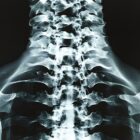Living with ongoing neck pain that travels down your arms can make daily life difficult. When conservative treatments don’t help, you might need cervical spine surgery. Understanding when surgery is needed can help you make better choices about your health.
What Conditions Lead to Cervical Spine Surgery?
Doctors don’t suggest spine surgery lightly. Here are the main reasons your doctor might recommend it:
1. Herniated Discs
A herniated disc happens when the soft inside of a spinal disc pushes through its tougher outer layer. This can squeeze nearby nerves, causing pain, numbness, and weakness in your neck, shoulders, and arms. In severe cases, patients may also experience leg numbness or weakness, walking difficulty, or urinary issues. While many herniated discs respond to non-surgical treatments, persistent or increasing symptoms that affect daily activities may require surgical intervention.
2. Spinal Stenosis
Spinal stenosis occurs when the spinal canal narrows, putting pressure on the spinal cord and nerves. In the neck, this often happens slowly as you age and discs wear down or bone spurs form. When stenosis causes worsening nerve problems or significant pain, surgery to relieve the pressure on the nerves may be needed.
3. Degenerative Disc Disease
The discs between your vertebrae naturally lose water and become less springy as you age. This breakdown can cause pain, instability, and sometimes nerve pressure. When regular treatments fail to control symptoms, surgical options like anterior cervical discectomy and fusion (ACDF) may be recommended.
4. Spinal Instability
Conditions like spondylolisthesis (where one vertebra slips forward over another) can create mechanical insufficiency in the cervical spine. This instability can squeeze nerves, cause pain, and create potentially dangerous movement of the vertebrae. Stabilizing procedures such as spinal fusion are often needed to fix these issues.
5. Traumatic Injuries
Injuries from car accidents, falls, or sports can cause breaks or dislocations in your cervical spine. These injuries might need immediate surgery to stabilize the spine and prevent or treat nerve damage.
6. Spinal Tumors
Tumors that grow in or near your cervical spine can compromise the stability of the spine and/or press on your spinal cord and nerves, causing pain and nerve symptoms. Surgical removal of these tumors with a fusion is often necessary to relieve pressure and prevent further damage.
7. Worsening Neurological Deficits
The most compelling reason for cervical spine surgery is the presence of progressive neurological deficits. Surgery may be necessary to prevent permanent nerve damage when symptoms like weakness, numbness, coordination difficulties, and/or urinary complaints worsen over time.
It's time to get back
to doing what you love.
Types of Cervical Spine Surgery
Depending on your specific condition, your neurosurgeon may recommend one of several surgical approaches:
Anterior Cervical Discectomy and Fusion (ACDF)/Arthroplasty
ACDF is one of the most common cervical spine procedures. It involves removing the damaged disc through a small incision in the front of the neck. Depending on your anatomy, the surgeon can reconstruct the spine using an artificial disc that mimics normal movement (arthroplasty) or fuse the adjacent vertebrae with a bone graft or synthetic implant, often secured with a metal plate and screws.
Cervical Laminoplasty
Cervical laminoplasty is a procedure performed through an incision down the back of the neck. The roof of the spinal canal, known as the lamina, is repositioned to increase the space in the spinal canal. The repositioned bones are held in place by small metal plates and screws. A laminoplasty allows continued movement as opposed to a fusion.
Cervical Laminectomy and Fusion
For more advanced and extensive degenerative disease, a laminectomy and fusion may be needed. Similar to a laminoplasty, surgery is performed through an incision in the back of the neck. Instead of repositioning the lamina, these bony elements are removed and the spine secured with metal screws/rods, and bone graft material to fuse the spine.
Minimally Invasive Spine Surgery
There are limited minimally invasive techniques to address cervical issues. For an isolated disc herniation, these approaches may be considered. Minimally invasive surgeries use smaller incisions and specialized instruments, resulting in less muscle damage, reduced blood loss, faster healing times, and quicker returns to regular activities.
Is Cervical Spine Surgery Right for You?
The decision to undergo cervical spine surgery should be made in consultation with a qualified neurosurgeon who specializes in spinal conditions. A comprehensive evaluation will consider:
- Your specific diagnosis and symptoms
- The severity and progression of your condition
- Your overall health and medical history
- Your response to conservative treatments
- Your lifestyle needs and goals
While surgery carries inherent risks, advancements in surgical techniques have made cervical spine procedures safer and more effective than ever before.
Recovery and Outlook
Recovery from cervical spine surgery varies depending on the specific procedure and individual factors. However, most patients can expect:
- The initial recovery period to last several weeks
- Gradual return to normal activities under medical guidance
- Physical therapy to restore strength and flexibility
- Long-term pain relief and improved function
For many patients, cervical spine surgery offers the opportunity to return to a pain-free, active lifestyle that wasn’t possible with conservative management alone.
Choosing the Right Surgical Team
When considering cervical spine surgery, selecting an experienced surgical team is crucial. Look for neurosurgeons who:
- Specializing in spinal procedures
- Have advanced training in current surgical techniques
- Offer comprehensive pre- and post-operative care
- Take time to explain your condition and treatment options
Take the Next Step
If you’re suffering from persistent neck pain, weakness, or other symptoms associated with cervical spine conditions, don’t wait to seek an expert evaluation. An experienced neurosurgeon can help determine if cervical spine surgery is the right option for your specific situation. Our expert team of internationally recognized surgeons include Dr. William Cobb, Dr. Michael Kaiser, Dr. Gaetan Moise, Dr. Alfred T. Ogden, and Dr. Jonathan Yun.

About Ridgewood
Our team of board certified physicians, located in Ridgewood, New Jersey, are dedicated to bringing you the latest developments and treatment options for spinal surgery. We strive to produce the most clarified & clear content to help you make informed decisions on your medical journey. The road to feeling like your true self should not feel lonely- Let us help you. Please call us to schedule a consultation and speak to one of our team members.
Recent Posts:






